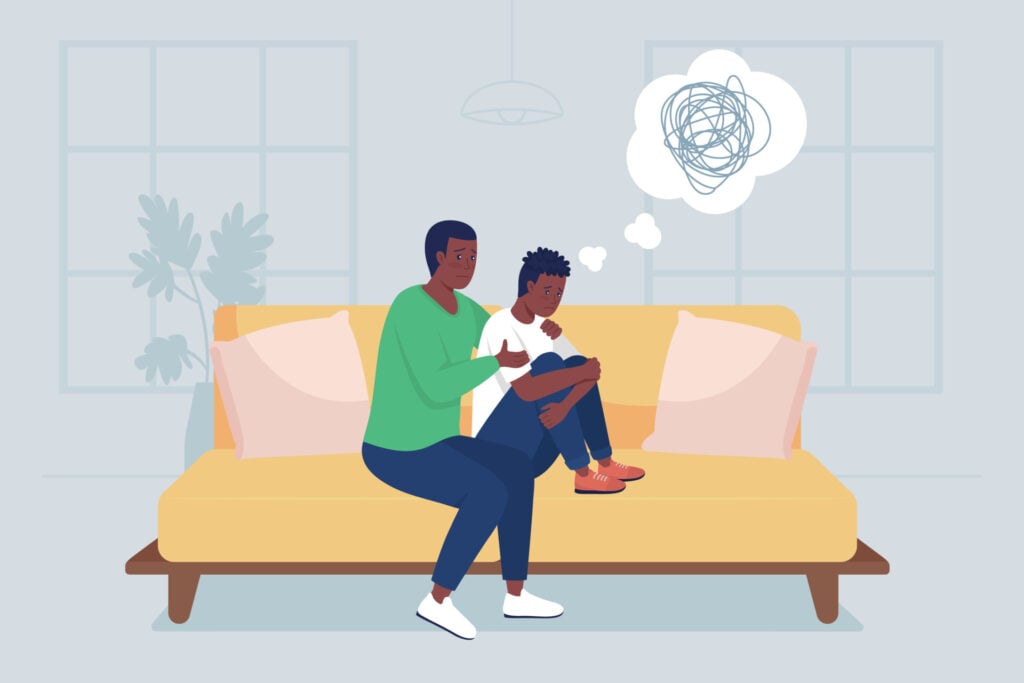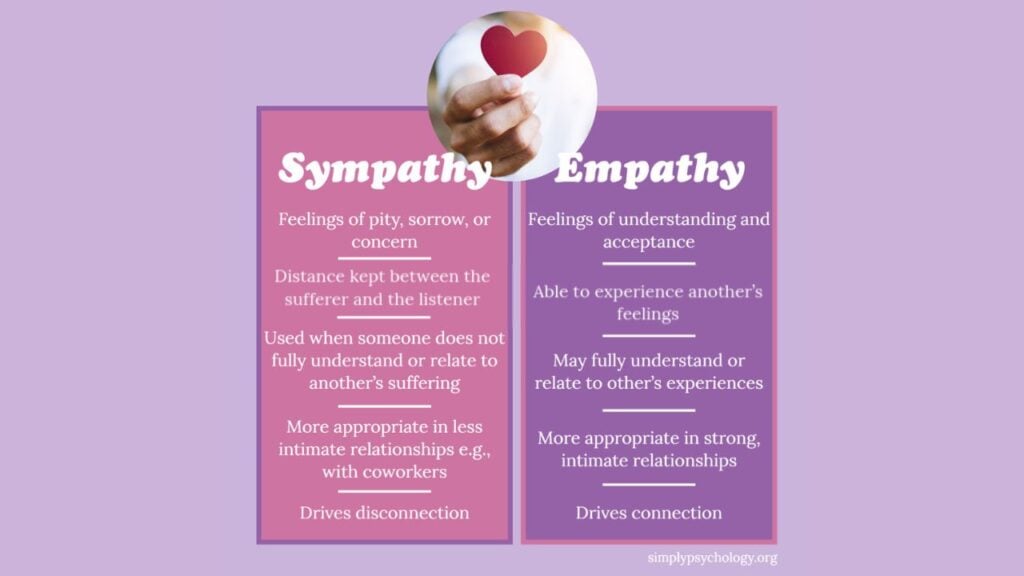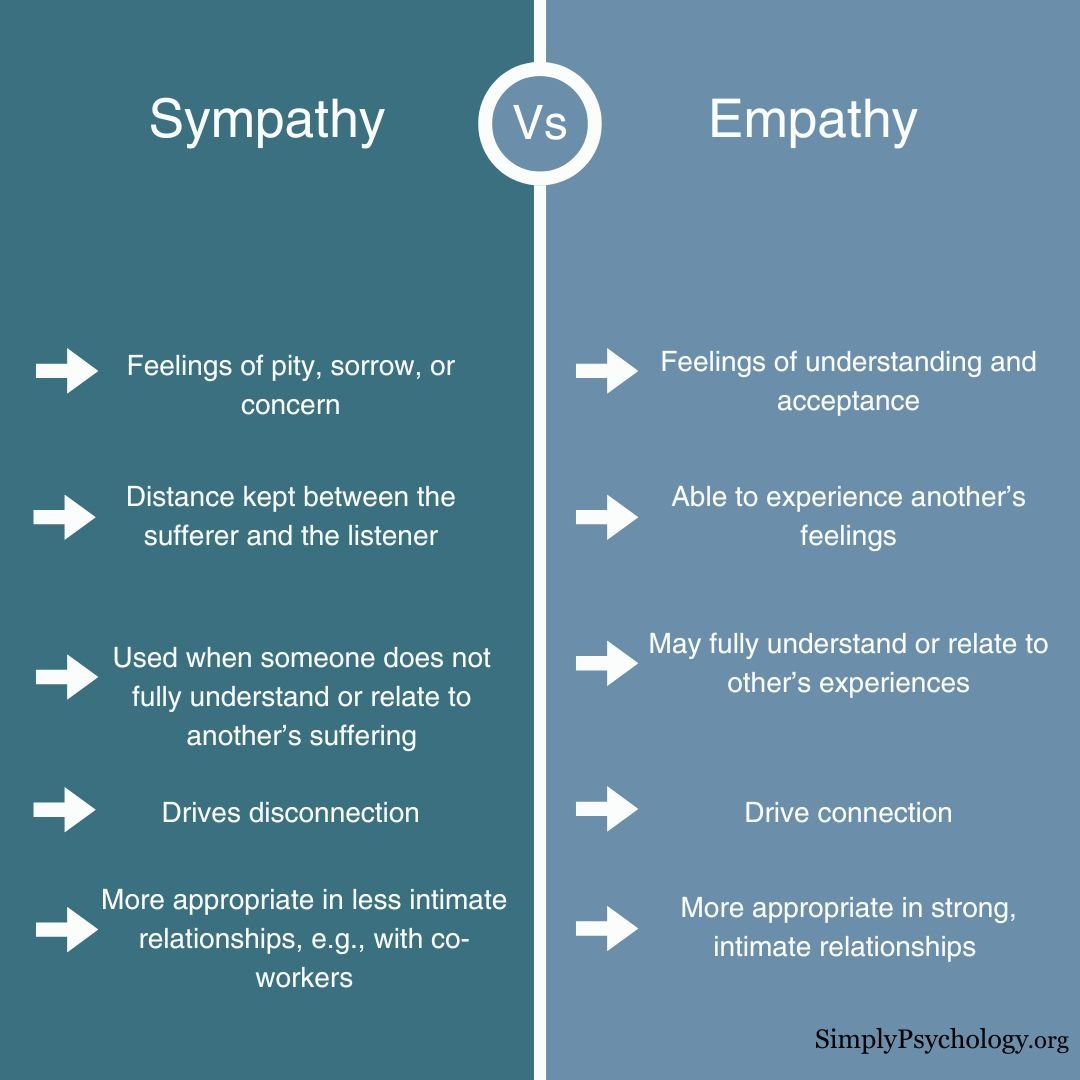Sympathy and empathy are two closely related but distinct emotions. Sympathy involves feeling sorry or pity for someone, whereas empathy involves understanding and sharing someone’s feelings. Sympathy is more of an external expression of emotion, while empathy is an internal emotional response.
Simply put, sympathy is feeling for someone, while empathy is feeling with someone. Understanding the difference between these two emotions can help us communicate and connect with others on a deeper level.

Definitions
The words sympathy, empathy, and compassion are closely related terms that are often used interchangeably.
However, they are different. The definitions of these terms often demonstrate different aspects of intersubjective experience.
- Sympathy is an emotion experienced in reaction to something that happens to others. When someone understands what another person is going through and feels sorrow or pity toward them, this is sympathy.
- Empathy is the ability to intimately feel and see another’s suffering, not just through understanding what they are going through but by being able to put themselves in another’s shoes. When expressing empathy, a person may use their personal experience to relate to another’s suffering.
- Compassion means ‘to suffer together,’ which is an expression of caring and warmth. Someone who expresses compassion recognizes the pain in another person and is motivated to help them.
What’s the difference between Empathy and Sympathy?
While sympathy and empathy are often used interchangeably, there are crucial differences that lead to different outcomes.
Emotion is the main difference
While sympathy means that someone understands someone else’s suffering, it is more cognitive and keeps a certain distance between the sufferer and the listener.
Being able to emphasize means being able to experience another’s feelings. It requires an emotional component of really feeling what the other person is feeling.
Difference in levels of understanding
Another difference between empathy and sympathy lies in the desire to understand the experience of a person who is suffering, not necessarily in the drive to stop their suffering.
Empathy is the ability to understand the emotions of another person. In contrast, sympathy is often utilized when a person does not necessarily relate to or fully understand the circumstances that someone is suffering.
Sympathy does not translate as understanding since the listener may shift focus away from the person in distress to focus on themselves instead.

The relationship matters
With empathy and sympathy, there is often a difference in the relationship between the listener and the sufferer.
In certain settings, such as when a co-worker or boss is suffering from loss, sympathy may be more appropriate to maintain particular social dynamics when there is not an intimate connection.
However, if a lifelong friend experiences a loss, sending a card or flowers may be inadequate. Empathy is usually expected more when the relationship between the sufferer and listener is close and strong.
Sympathy drives disconnection
Empathy is thought to drive connection, while sympathy is thought to drive disconnection, according to social psychologist Brené Brown.
Thus, while empathy brings people together and builds on strong connections, sympathy can create a divide between people.
Sympathetic statements such as ‘I’m sorry you feel like that’ or ‘It could have been worse’ can come across as patronizing.
Likewise, statements such as ‘I feel bad for you’ can come across as pitying, which can make the sufferer feel unsupported.
How do sympathy and empathy relate to compassion?
It is thought that empathy and sympathy can be sensations and open expressions of compassion.
This is based on the condition that empathy and sympathy come from a place of sincerity.
Compassion and empathy are fueled by an understanding of another human’s emotions. They both come with a desire and ability to connect to someone else and experience their pain.
Compassion, which arises from sincere empathy, can come from sharing similar experiences of suffering with another person.
Equally, compassion, which arises from sympathy, can be just as useful. For instance, someone may research and thus be knowledgeable on the types of abuse people can suffer.
They can then use this to increase their sympathy for people who have been abused, regardless of whether they have ever experienced abuse themselves.
Compassion often goes a step further as someone recognizes the pain in another and is motivated to help them, even if they cannot relate to the pain on a personal level.
To be able to extend emotions beyond an individual’s own personal experience is useful since this compassion allows humans to be motivated to reduce the pain that they have not personally experienced.
Actively promoting compassion can allow a listener in one situation to be a force for change in many others. Compassionate people can be socially impactful and ignite activism in the service of a cause that one cares about.
Types of Empathy
There are thought to be three parts to empathy that should be increased to become a better empathetic listener. These are: cognitive empathy, emotive empathy, and empathic action.
Cognitive empathy
This is the thinking part of empathy and a good starting point for becoming a better empathetic listener. This is where one can imagine themselves in the distressing situation of another and think about what that would feel like.
However, if this part is used without the following two parts of empathy, this may only become sympathy.
Emotive empathy
This is the feeling part of empathy. With emotive empathy, an individual stands alongside the person who is suffering and feels distressed with them. This is not feeling from a place outside or apart from the person, but together with them.
Empathic action
This is often the part that is difficult for many to cultivate. Empathic action often means sitting in silence and not doing anything. Many people may default to offering someone advice, solutions, or a diversion to ease their suffering; however, empathy is the opposite.
Acting on empathy by offering an empathic presence to someone is one of the most powerful actions there is.
How to increase empathy to be an empathetic listener
Below are some other tips for cultivating empathy:
Actively listen
When someone actively listens, they are not just listening to the words that are being said.
They are paying close attention to what the other person is saying, getting a sense of the feelings that the speaker is expressing, and looking out for non-verbal cues.
Listen patiently instead of focusing on what the response should be. When the person is finished speaking, take a moment to process the information before responding.
Understand what the other person needs
Resist the urge to leap to conclusions about what someone needs when they tell you what they are going through.
Use listening skills to figure out what they need, but if this is unclear, it is better to ask the other person what they need rather than provide the wrong kind of support.
Repeating back to someone what was heard is a good way to find out what someone needs.
For instance, saying, ‘What I am hearing is that you don’t feel valued when X happens, is that right?’ can get to the point of what the other person needs.
Prioritize emotional intelligence
Those who have high emotional intelligence tend to be more self-aware, are better able to manage themselves, are aware of social cues, and are more capable of managing relationships.
Practicing ways of being more emotionally intelligent can therefore go hand-in-hand with being an empathic listener.
What not to do
- Avoid asking direct questions, arguing with what is being said, and disputing facts. This can only drive a barrier between the listener and the sufferer. Instead, fully concentrate on what is being said and how the speaker feels
- Do not give your own judgments and opinions unless the speaker has asked for them. Let go of these and focus on the other person’s perspective. The listener does not need to agree with everything the other person says. Rather, it is about letting the speaker know that they are cared for and that they matter.
- Do not be afraid of silence in the conversation. Sometimes all someone needs is to feel heard and to know that the other person is there to listen. The speaker may be considering what to say next or may need a few silent moments to process their emotions.
Frequently Asked Questions
Which is stronger: sympathy or empathy?
Sympathy is essentially telling someone, ‘I know how you feel,’ whereas empathy is saying, ‘I feel how you feel.’
Empathy is deeper and more intense than sympathy. It is about acknowledging a person’s feelings and genuinely imaging and trying to feel what it’s like to be in their situation.
Can you be empathetic without being sympathetic?
Empathy is the ability to feel someone else’s emotions, whereas sympathy means feeling and/or showing a reaction such as sorrow or pity.
In the same way that sympathy can occur without empathy, it is possible to understand another person’s emotions without being sympathetic. For example, someone who is a narcissist may be able to perceive what others are feeling but lack the sympathy to care about another person.
Is empathy the same as altruism?
These two terms are related emotions; therefore, many tend to consider them as the same thing. However, someone who is altruistic can practice selfless concern for others’ welfare.
It is the charitable emotion to help others without expecting anything in return. Empathy, on the other hand, is the ability to understand another’s emotions and to share their feelings.
Empathy and altruism are related since both trigger acts of generosity in someone towards another. Empathy can also be the reason why someone is altruistic.
What is a dark empath?
Not all empaths have good intentions. Someone who is a dark empath is highly attuned to others’ emotions, but they use their empathic abilities as a weapon.
A dark empath knows how to connect with another person but can use their knowledge to manipulate or take advantage of another person.
A dark empath can give a false sense of trust to others when first getting to know them since they can portray their empathy in a positive light. This can lead to others thinking highly of them since they clearly show displays of empathy.
This makes it more dangerous later down the line when the dark empath uses their empathy to manipulate others for personal gain, but it may not be recognized until others get hurt.
Can you have compassion without empathy?
Compassion is not the same as empathy, although the concepts are related. Empathy refers more generally to the ability to take the perspective of and feel the emotions of another person, whereas compassion is when those feelings and thoughts include the desire to help.
It is possible to display kindness and compassion for practical reasons without any real empathy for others’ suffering. Someone may have the desire to help people in need without attaching deeper emotions and understanding of the suffering they are going through.
What is more important: empathy or compassion?
Empathy and compassion are needed in everyday life, especially when interacting with others. Without them, it can be difficult to maintain healthy relationships.
Empathy and compassion can help people to exhibit kind and loving behavior toward people they care about, which helps reinforce relationships.
As previously mentioned, dark empaths and narcissists can use empathy to manipulate others. A time when empathy may be dangerous on its own is when it comes to leadership.
In times of crisis, having a leader who is only empathetic may understand others’ suffering, but this does not mean they will do anything about it. Being a compassionate leader, on the other hand, can cultivate positive change and unify people.
References
Breyer, T. (2020). Empathy, sympathy and compassion. In The Routledge handbook of phenomenology of emotion (pp. 429-440). Routledge.
Brown, B., Davis, K., Stephenson, A., & Francis-Sears, A. (2013). Brené Brown on empathy.
Heym, N., Kibowski, F., Bloxsom, C. A., Blanchard, A., Harper, A., Wallace, L., Firth, J. & Sumich, A. (2021). The Dark Empath: Characterising dark traits in the presence of empathy. Personality and individual differences, 169, 110172.
Jeffrey, D. (2016). Empathy, sympathy and compassion in healthcare: Is there a problem? Is there a difference? Does it matter?. Journal of the Royal Society of Medicine, 109(12), 446-452.
Salem, R. (2003). Empathic listening. Beyond intractability.
Further information


